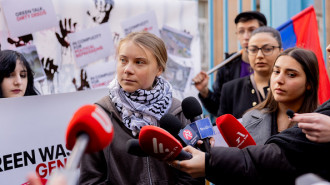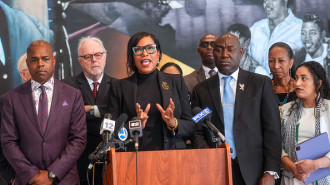Nabih Berri re-elected again as Lebanon house speaker, despite opposition
Nabih Berri was re-elected as Lebanon's Speaker of the House on Tuesday, marking the lawmaker's seventh consecutive term since he first took the job 30 years ago.
Berri, the 84-year-old leader of the Shia-dominated Amal Movement, was elected by 65 votes, the minimum amount needed. In 2018, he received an absolute majority with 98 votes.
MPs insisted that their ballots be read aloud, though usually votes are simply counted and tallied. Forty protest votes were cast, with phrases written on them such as "Justice for the victims of the Beirut blast" and "justice for raped women". Twenty-three blank ballots were also submitted.
The deputy speaker of the house was also elected after long-time deputy speaker Eli Ferzli lost his seat in the 2022 election. Elias Bou Saab was voted in as deputy with the minimum amount of votes needed. Bou Saab is a former defence minister and is supported by the Amal Movement, Iran-backed Hezbollah, and the Maronite Free Patriotic Movement.
Berri is an iconic figure of Lebanese politics, commonly referred to as one of the country’s “three popes” alongside the PM and president. His thirty-year tenure has made him one of the most recognizable faces among the political class.
Celebratory gunfire erupted in Beirut after he was elected, despite Berri’s request that supporters refrain from doing so.
Though Berri was widely expected to retain his position as house speaker, he faced unprecedented opposition from Lebanon's newly elected parliament.
Lebanon’s 15 May election saw parliamentary dynamics shift, with a raft of new independent MPs and a victory for the pro-Saudi Lebanese Forces ousting Hezbollah from its majority position.
Independent MPs, the Maronite-dominated Lebanese Forces, and Kataeb all resolved to oppose Berri’s candidacy, depicting him as a corrupt figure of the Lebanese political establishment.
Despite the vocal opposition, Berri and his allies were able to secure the minimum amount of votes needed. Berri is a long-time parliamentary ally of Hezbollah, which commands a hefty share of seats in Lebanon's 2022 government.
There was no alternative candidate to Berri, as Lebanon’s sectarian confessional system mandates that the Speaker of the House should be a Shia Muslim.
All of the Shia Muslims elected to the parliament are affiliated with either Hezbollah or the Amal movement and would not run against Berri.
Lebanon's new parliament, led by its speaker, will be tasked with steering the country out of its dire economic crisis. At the top of the agenda will be passing the necessary economic reforms to secure an IMF aid package.
Lebanon's currency nosedived in the days following the election, losing 25 percent of its value over the course of ten days. The price of basic goods also shot up alongside the currency, with the price of fuel increasing twice in a ten-day period.
Analysts have warned that the dynamics of Lebanon's new parliament lend themselves to deadlock and that inaction could be a death knell for the country's recovery prospects.







 Follow the Middle East's top stories in English at The New Arab on Google News
Follow the Middle East's top stories in English at The New Arab on Google News


